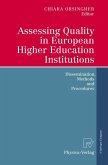Quality accreditation in higher education institutions (HEIs) is currently a buzzword. The need to maintain high-quality education standards is a critical requirement for HEIs to remain competitive in the market and for government and regulatory bodies to ensure the quality standards of programs offered. From being an implicit requirement that is internally addressed, quality assurance activities become an explicit requirement that is regularly audited and appraised by national and international accreditation agencies. HEIs are voluntarily integrating quality management systems (QMS), institutional and program-specific, in response to the political and competitive environment in which it exists. Through its higher education department or by creating non-profitable accreditation bodies, many governments have implemented a quality framework for licensing HEIs and invigilates its adherence based on which accreditation statuses are granted for HEIs. Global Perspectives on Quality Assurance and Accreditation in Higher Education Institutions provides a comprehensive framework for HEIs to address quality assurance and quality accreditation requirements and serves as a practical tool to develop and deploy well-defined quality management systems in higher education. The book focuses on the critical aspects of quality assurance; the need to develop a concise and agile vision, mission, values, and graduate attributes; and to develop a system that effectively aligns the various activities of the HEI to the attainment of the strategic priorities listed in the institutional plans. The chapters each cover the various facets of the quality assurance framework and accreditation agencies' requirements with practical examples of each. This book is useful for HEI administrators, quality assurance specialists in HEIs, heads of academic departments, internal auditors, external auditors, and other practitioners of quality, along with stakeholders, researchers, academicians, and students interested in quality assurance and accreditation in higher education.








